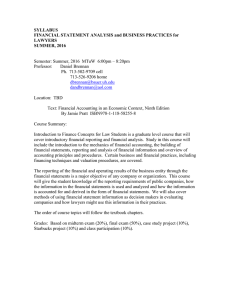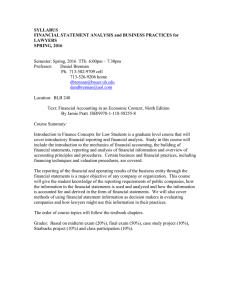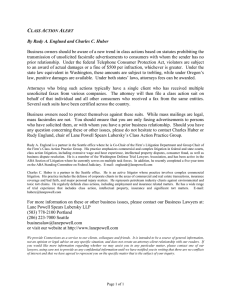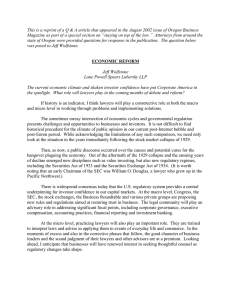Document 13423382
advertisement
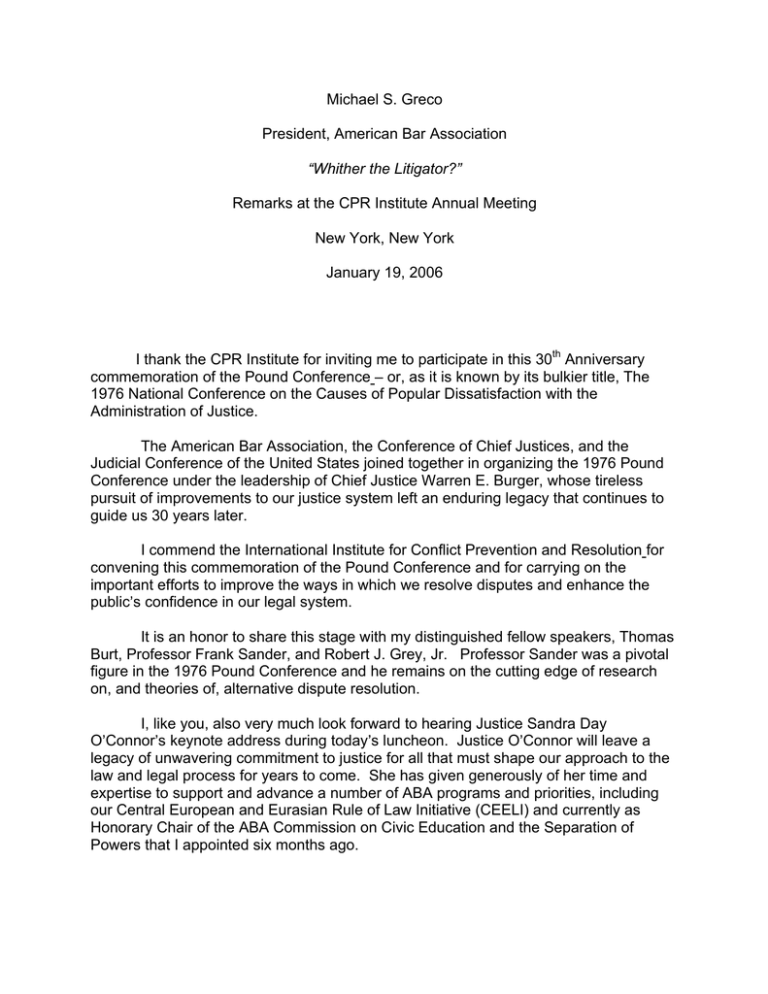
Michael S. Greco President, American Bar Association Whither the Litigator? Remarks at the CPR Institute Annual Meeting New York, New York January 19, 2006 I thank the CPR Institute for inviting me to participate in this 30th Anniversary commemoration of the Pound Conference or, as it is known by its bulkier title, The 1976 National Conference on the Causes of Popular Dissatisfaction with the Administration of Justice. The American Bar Association, the Conference of Chief Justices, and the Judicial Conference of the United States joined together in organizing the 1976 Pound Conference under the leadership of Chief Justice Warren E. Burger, whose tireless pursuit of improvements to our justice system left an enduring legacy that continues to guide us 30 years later. I commend the International Institute for Conflict Prevention and Resolution for convening this commemoration of the Pound Conference and for carrying on the important efforts to improve the ways in which we resolve disputes and enhance the public s confidence in our legal system. It is an honor to share this stage with my distinguished fellow speakers, Thomas Burt, Professor Frank Sander, and Robert J. Grey, Jr. Professor Sander was a pivotal figure in the 1976 Pound Conference and he remains on the cutting edge of research on, and theories of, alternative dispute resolution. I, like you, also very much look forward to hearing Justice Sandra Day O Connor s keynote address during today s luncheon. Justice O Connor will leave a legacy of unwavering commitment to justice for all that must shape our approach to the law and legal process for years to come. She has given generously of her time and expertise to support and advance a number of ABA programs and priorities, including our Central European and Eurasian Rule of Law Initiative (CEELI) and currently as Honorary Chair of the ABA Commission on Civic Education and the Separation of Powers that I appointed six months ago. All lawyers, indeed all Americans, owe Justice O Connor great thanks for the remarkable talents and energy that she has brought to the pursuit of justice throughout her distinguished career. Please join me in acknowledging Justice O Connor. The title of my remarks, Whither the Litigator? , might give the misleading impression that I, or the American Bar Association, see the archetypal litigator as a vanishing breed. I am not here to deliver that message. Like many lawyers and judges throughout the United States, I am concerned about the future of traditional litigation, for reasons that I will share with you in a moment, but I do not believe that litigation should or will go the way of the dinosaur anytime soon. The robust debate over the current state and future of what we characterize as the trial highlights the difficulty of evaluating precisely where we are and where we are heading in the world of litigation and alternative dispute resolution. I usually try not to step in between law professors engaged in rhetorical battle, but I will make an exception in this instance, in order to put my remarks in context. Professor Marc Galanter of the University of Wisconsin Law School, who has written extensively on The Vanishing Trial and has worked with the ABA Section of Litigation, presents compelling data to show that civil trial rates have fallen dramatically over the past 40 years, while the number of lawyers and cases filed during the same time period have increased. On the other hand, Professor John Lande of the University of Missouri-Columbia School of Law, a member of the Council of the ABA Section of Dispute Resolution, argues in an article in the CPR Institute s publication, Alternatives, that The Vanishing Trial is a myth that does not take into account the shift to pre-trial work that has characterized the past 40 years and which does not necessarily belong outside an expanding but logical definition of litigation. I mention this debate because I think it serves as a good example of the many ambiguities and the wide latitude for interpretation in assessing phenomena in the realm of law. As President of the ABA I represent and speak for the interests of the entire spectrum of the legal profession, including litigators and ADR proponents. It is important to note that the ABA Section of Litigation remains a powerful force in the profession, with a strong membership base and a diverse array of programs, publications and services for litigators in our country and abroad. The ABA Section of Dispute Resolution is also very healthy, and it continues to grow and expand its reach, as does the CPR Institute and other organizations working to promote the effective use of ADR. I recognize that there are some tensions between litigation and ADR, and between their strongest proponents, but I see more complements and opportunities for blended approaches to dispute resolution than irreconcilable conflicts or differences between the two. While my own practice over the past 34 years has focused largely on business litigation, during the past decade or so I have done a great deal of mediation and arbitration work, both as counsel and as mediator or arbitrator. I respect, and enjoy being in, the courtroom, and participating in the search for truth and justice that is the hallmark of adversarial proceedings. I honed my trial and mediation/arbitration skills in many court rooms as a young lawyer. And I have great confidence in the ability of the primary actors in the trial setting judges, lawyers and jurors alike to separate chaff from wheat to arrive at the essential facts and applicable law, and do justice, in a dispute. But I also recognize the tremendous value of alternative dispute resolution processes in achieving efficiencies in our justice system, and of more mutuallybeneficial outcomes for clients than are sometimes possible through the use of traditional litigation. My experience is probably not too different from that of many other lawyers in America who think of themselves first and foremost as trial lawyers whether on the defense or plaintiff side. Lawyers of my generation did not learn as much about mediation or arbitration in law school or as young practitioners as have succeeding generations of lawyers, but many of us have embraced ADR as it has become a truly viable and proven alternative to litigation. Trial lawyers have learned, sometimes to their surprise, that many of the skills learned in the courtroom are important in mediation, arbitration, and settlement negotiations. I have concern, however, that trial advocacy skills may wither, if succeeding generations of law students and lawyers do not see their value in a legal landscape that they perceive to be dominated by transactional law and negotiated settlements -- If they do not hone their skills in traditional court room trials. The skills of cross-examination, of meticulously marshalling and mastering the evidentiary details, of the skilled presentation of the important evidence, of persuasive oral advocacy based on a command of the facts and law, are important not just to clients in a private dispute, but to addressing legal disputes outside the hearing room, in countless venues in our communities and in society. Even if a substantial proportion of lawyers rarely or never pursue cases all the way to trial, the trial skills that students acquire in law school and that young lawyers learn from experienced litigators help make them better advocates and counselors, and problem solvers in society. Preparation for and anticipation of a trial, even if the odds are remote that a trial will occur, can provide one of the strongest motivations for lawyers to be zealous and thoroughly competent advocates for their clients, and for societal causes. If the trial lawyer s skill set is diminished, or marginalized, who will litigate those cases in the future that are best resolved at trial? And who will zealously and competently advocate for the public on societal issues that trial lawyers have addressed since the beginning of our country? While it is certainly not necessary for every law student to prepare for a career as a litigator, it would be a great disservice to the profession, and to the American people, if litigation skills were to be disproportionately de-emphasized in the education and training of lawyers. I know that some of you are thinking that the trial skills that I am talking about can be developed just as effectively in ADR proceedings. Having served as arbitrator and mediator in scores of cases huge and small during the past decade, observing numerous lawyers present their cases, I can tell you that the most effective arbitration and mediation counsel I have observed have been those who developed their skills as trial lawyers. In these remarks I also want to underscore the value of public proceedings when a public interest is at stake. We know that one of the great attractions of ADR to disputants is the opportunity for them to keep confidential the resolution of their dispute. In cases where substantial harm has been done to a significant number of people, or where the public s health and safety are implicated by harm to one person, the confidentiality of ADR processes may not advance the public s interest in ensuring that those responsible for the harm are held accountable, and dissuaded from future harmful acts, and the public s right to know what is going on in the marketplace of business people and consumers and their behavior. In a number of specific areas, the ABA has worked for many decades to promote policies that ensure fairness in ADR processes while preserving the rights of litigants to pursue resolution of disputes through the courts. Since 1971, the American Bar Association has adopted nearly 40 policy statements and recommendations relating to alternative dispute resolution, and those are summarized in the course book for this conference. ABA policies on ADR include a far-reaching resolution calling for the expansion of court-annexed ADR programs, adopted in 1997, which enabled the ABA to work with the United States Judicial Conference, the Department of Justice, and Congress to promote the enactment of the Alternative Dispute Resolution Act of 1998. The ABA has also taken an active role in promoting ADR at the international level, through programs such as the effective and highly acclaimed Mediation in Mexico project of our Latin America Law Rule of Law Initiative, to name just one example. American and international lawyers working on the international stage have understood for some time the great value of ADR in resolving disputes within and across national borders. The fast-evolving global economy requires that we seek out more ways to communicate and work more effectively with lawyers and clients around the world to resolve cross-border disputes efficiently and effectively, and ADR holds great promise to address this imperative. My conclusion, perhaps not surprising to you, is that there must be a place in our society for both litigation and ADR; that we need, and must ensure the continuation of both highly skilled trial lawyers and ADR counsel. Thank you for your kind attention, and I look forward to engaging in discussion with you.


